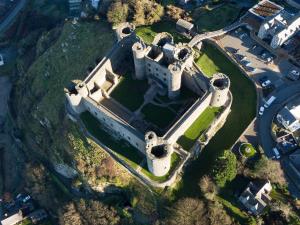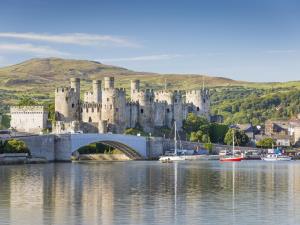Llanfairpwllgwyngyll...
As you might gather while trying to read any local road signs, a 19th century joker was responsible for naming this town on Anglesey (deep breath) Llanfairpwllgwyngyllgogerychwyrndrobwllllantysiliogogogoch. It is, naturally, a record-breaker and the stuff of films, music and books –enjoy the picturesque village, and go landscape for any photos with those signs.

Castell Harlech (Harlech Castle), Eryri (Snowdonia)
On a spur of rock above the Irish Sea, breathe in and think of Owain Glyndŵr, the medieval ruler and last Welsh Prince of Wales. Castell Harlech (Harlech Castle) was his brief home after a revolt against the English, but fell again in 1409. It remains one of the greatest castles in Europe.


Castell Conwy, (Conwy Castle), Conwy
Castell Conwy (Conwy Castle) is an incredible complex of eight towers in a medieval fortification reached by bridge, there are endless stories to discover within the walls of this magnificent landmark of myth and legend. Edward I moved monks on to build it, but Owain Glyndŵr cunningly seized it in an early 15th century Welsh uprising.

Lady of the Lake, Llyn y Fan Fach, Carmarthenshire
Or more specifically, Llyn y Fan Fach, a lovely glacial lake on the western flanks of the Bannau Brycheiniog (Brecon Beacons) National Park. Here lived the beautiful Lady of the Lake, who married a local farm lad with a pre-nuptial clause that if he struck her three times, she would go straight back to her lake and take all the farm animals with her. In common with our other Welsh heroines, the marriage ended in tears, but their sons went on to become the first of many generations of expert herbalists and healers, the Physicians of Myddfai.


Ynys Enlli (Bardsey Island)
Ynys Enlli (Bardsey Island) is said to be the resting place of 20,000 saints, who share this beautiful North Wales island where grey seals bask on rocks and wildlife is abundant. The Welsh name for Bardsey, Ynys Enlli, means ‘island of the currents’ and it’s a great place for day trips. Just hop on a boat from Aberdaron or Pwllheli and sail to the place where Christians have been travelling to since the 6th century, when St Cadfan established a monastery on the island.
In 2023 the island became the first site in Europe to be awarded International Dark Sky Sanctuary certification. It joins 16 other sites worldwide recognised as the most remote and dark places on earth.

Mari Lwyd, St Fagans Museum
Meaning ‘Grey Mare’ or ‘Holy Mary’, the Mari Lwyd is a horse figure carried from house to house at Christmas. Its wassailing singers indulge in a round of lampooning and, in a merry conclusion, an exchange of ales and cakes. Try it for yourself every December at the brilliant St Fagans National Museum of History.

The Princes of Gwynedd
You might know the 12th and 13th century lands of North Wales from their immortalisation in the much-loved Princes of Gwynedd stories. Following in their footsteps is easy and evocative, but the ruined Castell Dolwyddelan, once the fortification of Llywelyn the Great, is a must-see on the crags of North Wales.


King Arthur
There are thought to be over 300 sites in Wales that claim some connection with King Arthur, including Arthur’s Stone, Gower, Caerleon and The summit of Yr Wyddfa (Snowdon).
The real Arthur was probably a Romano-British chieftain who fought against the invading Anglo-Saxons in the 5th century. Arthur’s heroic deeds were recounted by medieval Welsh poets and story tellers, and the tales became richer and more embroidered with each telling. King Arthur and his entourage are linked with scores of sites all over Wales, from standing stones and caves to lakes and islands.

Owain Glyndŵr (c1359–c1415)
You’ll still see Owain Glyndŵr’s flag, four lions rampant on gold-and-red, flying proudly on flagpoles around Wales today, including outside the Owain Glyndŵr Centre in Machynlleth. This great national hero was born around 1359 into a noble Welsh family, and served the English crown as a soldier. Glyndŵr had retired to peaceful middle-age in the borderlands … until a neighbouring baron swindled him out of land. Glyndŵr’s fight for justice ignited a full-scale rebellion against Henry IV. By 1404 Glyndŵr controlled most of North and Mid Wales from his court in Harlech Castle. In 1404 he held his first parliament in Machynlleth, where he was crowned Prince of Wales - the last native Welshman to bear the title. The rebellion was suppressed in the early 1410s; Glyndŵr himself was never captured, but mysteriously vanished.


Branwen
The stories collected in the Mabinogion (or to give them their correct title, the Four Branches of the Mabinogi) are the earliest surviving works of British prose literature. They were passed on orally for centuries before finally being written down in Welsh in the 11th century. Branwen plays a starring role in the second Branch as the sister of Bendigeidfran, the giant king of Britain, who marries her off to the king of Ireland. It doesn’t end well: after a series of gory incidents involving mutilated horses, severed heads and a magical cauldron, Branwen returns to Wales to die of a broken heart. According to tradition, she’s buried near the village of Llanddeusant on Anglesey, where there’s a Bronze Age burial mound called Bedd Branwen (Branwen’s grave).
Llywelyn ap Gruffudd (c1223–1282)
Llywelyn ‘the Last’ (or in Welsh, Ein Llyw Olaf – ‘our last leader’) was the last sovereign Prince of Wales. He came from noble lineage: his grandfather was Llywelyn the Great, who had ruled over Wales for 45 years. The grandson’s hold on power was far shakier: although by 1270 Llywelyn controlled three-quarters of Wales from his powerbase in Eryri (Snowdonia), his reign was constantly under threat from the English crown, Marcher Lords, lesser Welsh princes, and even his own brothers. In 1282 Llywelyn led his army south, to rally support in Mid Wales. He was killed by English soldiers near Builth Wells; today he is commemorated by a stone monument at Cilmeri.

Blodeuwedd
We meet our heroine Blodeuwedd in the fourth Branch of the Mabinogi. A man named Lleu has been cursed: he will never marry a human wife. Two enterprising magicians make a wife for Lleu out of flowers - Blodeuwedd (her name means ‘flower face’). The couple settle down at a castle near Trawsfynydd until Blodeuwedd has an ill-advised fling with the lord of Penllyn (modern-day Bala). In revenge, she’s hunted down to Llyn Morwynion ('the lake of the maidens’) near Blaenau Ffestiniog, and turned into an owl.


Merlin
Merlin crops up widely in early Celtic literature as a mystical wild man of the woods, but it was the 12th century cleric Geoffrey of Monmouth who laid the foundations of Merlin’s popular image as King Arthur’s supernatural sidekick. It was the boy wizard Merlin who discovered why the castle walls of Dinas Emrys, near Beddgelert kept falling down: two dragons, one red and one white, were fighting in a pool beneath the castle (the red dragon won, of course – and became the symbol of the fight against the Saxon foe). As the legend grew, Merlin became Arthur’s wise counsellor and court magician. In Wales, he’s most strongly associated with Carmarthen: the town’s Welsh name is Caerfyrddin; Myrddin is the Welsh form of Merlin, hence ‘Merlin’s Fort’.
Rhiannon
Women in the Mabinogi often get a tough time, but Rhiannon emerges as one of the strongest and most likeable characters in the entire canon. She is married (mostly happily) to Pwyll, prince of Dyfed and, after his death, Manawydan, a warrior who in later poems is one of King Arthur’s knights. Rhiannon is probably based on a Celtic horse goddess - she first appears on a gleaming white horse - and has three magical birds whose song can ‘wake the dead and lull the living to sleep’. She was celebrated in the Fleetwood Mac song that bears her name, and remains a popular folk figure around Narberth, where she made her home.

Bendigeidfran
‘Brân the Blessed’ was the giant king of Britain, ruling the island from his court in Harlech. He married off his sister Branwen to the king of Ireland, but discovered that she wasn’t being treated well, and set off to rescue her. Being a giant, Bendigeidfran waded across the Irish Sea, then lay across the River Shannon so his army could walk over his back. The giant king was mortally wounded in the skirmish that followed, and instructed his men to cut off his head and bury it in London – facing France, so that Britain would never be invaded by sea.


St Dwynwen
St Dwynwen (Santes Dwynwen) was a fourth-century Welsh princess. We celebrate St Dwynwen's day on 25 January.

St David
St David was born in 500 AD. He is our patron saint. We celebrate St David's Day on 1 March.








